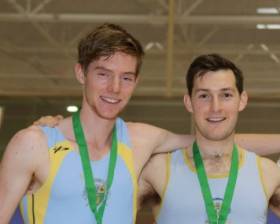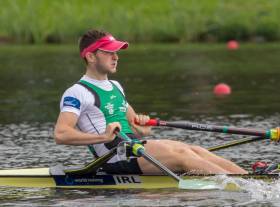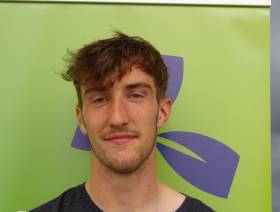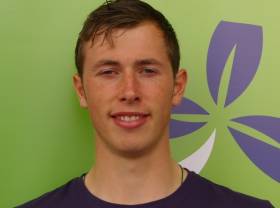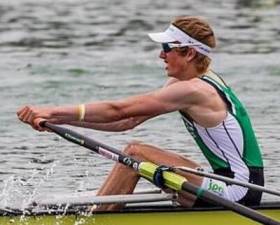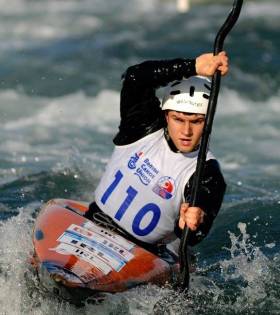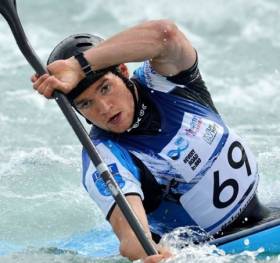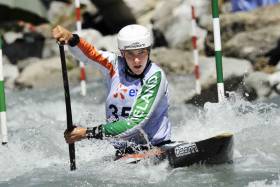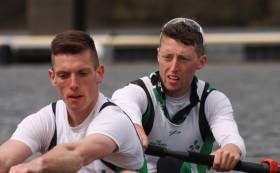Displaying items by tag: World Championships
Brilliant Win Sends Ireland Pair Into World Rowing Final
#Rowing: Ireland’s David O’Malley and Shane Mulvaney became the country’s first A Finalists at the World Rowing Championships in Rotterdam today. The under-23 lightweight pair won their semi-final with almost three seconds to spare. The two UCD men took over from early leaders Turkey by half way and then left the rest behind. Turkey finished second and the United States ousted Canada to take the third A Final spot.
World Rowing Championships, Rotterdam (Irish interest; selected results)
Men
Under-23 Lightweight Pair - Semi-Finals (First Three to A Final; rest to B Final) - Semi-Final One: 1 Greece 6:39.18, 2 Switzerland 6:40.01, 3 China 6:44.52. Semi-Final Two: 1 Ireland (S Mulvaney, D O’Malley) 6:46.20, 2 Turkey 6:49.11, 3 United States 6:50.75.
O'Driscoll and O'Donovan in World Rowing Semi-Finals
#Rowing: Shane O’Driscoll and Mark O’Donovan qualified for the A/B Semi-Finals of the World Rowing Championships today. Two boats qualified from the heat of the lightweight pair, and the Ireland crew chased the world champions, Britain, down the course. Russia eventually finished third, but by then the Ireland crew had nailed the crucial second place.
World Rowing Championships, Rotterdam (Selected Results; Irish interest)
Men
Lightweight Pair - Heat Two (First Two to A/B Semi-Finals; rest to Repechages): 1 Britain (J Cassells, S Scrimgeour) 6:37.05, 2 Ireland (M O’Donovan, S O’Driscoll) 6:38.84; 3 Russia 6:44.40, 4 Spain 6:45.08, 5 China 6:59.44.
Lightweight Single Sculls - Heat Three (Four to Quarter-Finals; rest to Repechages): 1 Ireland (P O’Donovan) 7:11.73, 2 Japan 7:16.87, 3 Serbia 7:19.70, 4 China 7:23.04.
Under-23 Quadruple - Repechage One (Three to A/B Semi-Finals; rest to C Final): 1 Britain 5:54.05, 2 Russia 5:56.18, 3 Ireland (D Buckley, J Casey, P Boomer, S McKeown) 5:57.67.
O'Donovan Dominant in Heat at World Rowing Championships
#Rowing: Paul O’Donovan won his heat with a dominant performance at the World Rowing Championships in Rotterdam today. The Ireland lightweight single sculler made light of the difficult condtions and left the rest of the field behind - Japan’s Yuki Ikeda, in second, was over five seconds behind the UCD clubman. O’Donovan will now have a good lane draw in the quarter-final.
World Rowing Championships, Rotterdam (Selected Results; Irish interest)
Men
Lightweight Single Sculls - Heat Three (Four to Quarter-Finals; rest to Repechages): 1 Ireland (P O’Donovan) 7:11.73, 2 Japan 7:16.87
3 Serbia 7:19.70, 4 China 7:23.04.
Under-23 Quadruple - Repechage One (Three to A/B Semi-Finals; rest to C Final): 1 Britain 5:54.05, 2 Russia 5:56.18, 3 Ireland (D Buckley, J Casey, P Boomer, S McKeown) 5:57.67.
Ireland Quadruple Makes World Rowing Semi-Finals
#Rowing: Ireland’s under-23 heavyweight quadruple qualified for the semi-finals at the World Rowing Championships in Rotterdam today. The crew of Daniel Buckley, Jack Casey, Patrick Boomer and Sam McKeown took the third qualification place behind Britain and Russia in their repechage. They join the Ireland under-23 lightweight pair and lightweight quadruple, which qualified from their heats.
World Rowing Championships, Rotterdam (Selected Results; Irish interest)
Men
Under-23 Quadruple - Repechage One (Three to A/B Semi-Finals; rest to C Final): 1 Britain 5:54.05, 2 Russia 5:56.18, 3 Ireland (D Buckley, J Casey, P Boomer, S McKeown) 5:57.67.
Ireland Quadruple Set for Repechages at World Rowing
#Rowing: Ireland's under-23 heavyweight quadruple finished fifth in their heat at the World Championships in Rotterdam and must compete in a repechage to find their way into the A/B semi-finals. The crew of Daniel Buckley, Jack Casey, Patrick Boomer and Sam McKeown needed to finish in the top two to qualify directly. Australia had the confidence and speed to take the lead early and go on to win; Britain and Italy fought it out for the crucial second place, with the Italians taking it. Ireland were fourth down the course but were passed by Norway in the final quarter.
World Rowing Championships, Rotterdam (Selected Results; Irish interest)
Men
Under-23 Lightweight Pair - Heat Two (First Three to A/B Semi-Final; rest to Repechages): 1 Turkey 6:39.80, 2 Greece 6:40.70, 3 Ireland (S Mulvaney, D O’Malley) 6:45.09.
Under-23 Quadruple - Heat Three (First two A/B Semi-Final; rest to Repechages) 1 Australia 5:52.01, 2 Italy 5:53.31; 5 Ireland (D Buckley, J Casey, P Boomer, S McKeown) 6:15.47.
O'Malley and Mulvaney Hit the Mark at World Rowing Championships
# Rowing: Ireland’s campaign at the World Championships in Rotterdam, which feature senior, under-23 and junior events, started well this morning. The Ireland Under-23 lightweight pair of David O’Malley and Shane Mulvaney secured a semi-final place. Greece and Turkey swapped places ahead of them, but the Ireland crew nailed down third and direct qualification. Germany struggled and could only take fourth and a repechage place. Turkey passed Greece before the line.
World Rowing Championships, Rotterdam (Selected Results; Irish interest)
Men
Under-23 Lightweight Pair - Heat Two (First Three to A/B Semi-Final; rest to Repechages): 1 Turkey 6:39.80, 2 Greece 6:40.70, 3 Ireland (S Mulvaney, D O’Malley) 6:45.09.
Curtis Left To Rue Close Call at World Championships
#Canoeing: Sam Curtis was left to rue his close miss in the first run of the under-23 K1 at the canoe slalom World Championships in Krakow in Poland. The Irishman had to wait around for a protracted period as a technical issue was sorted out in the middle of the second run, and he did not do well. He touched five gates and missed one – gate 11. He was well outside the qualifying mark for the semi-finals. Noel Hendrick and Eoin Teague also missed out.
Canoe Slalom World Championships, Under-23 and Junior, Krakow, Poland (Irish interest; selected results)
Men
Under-23 K1 (racing kayak) – First Run (Top 30 Qualify): 35 S Curtis 86.08; 69 E Teague 137.71; 70 N Hendrick 138.45. Second Run (10 Qualify): 22 Hendrick 94.34; 35 Teague 137.21; 38 Curtis 144.47.
Junior K1 – First Run (30 Qualify): 50 S Ansell 110.33; 63 C McLarnon 150.29; 74 C Vaugh 214.05. Second Run: 28 Ansell 109.79; 38 Vaugh 148.67; 44 McLarnon 185.63.
Women
Under-23 K1 – First Run (15 Qualify): 30 C O’Ferrall 156.80. Second Run (5 Qualify): 23 O’Ferrall 251.16.
Curtis So Close on First Run at World Championships
#Canoeing: Under-23 competitor Sam Curtis came frustratingly close to direct qualification on his first run at the canoe slalom World Championships in Krakow, Poland, this morning. The Irish paddler, competing in a K1, completed the course in 84.08 seconds, but he touched the second last gate and was given a two-second penalty. It pushed him above the direct qualification mark. Eoin Teague set a time of of 89.71, including four seconds in penalties for touches on gates two and 14. However, he dropped out of contention in this run when he was retrospectively ajudged to have missed gate two and given a 50-second penalty. Noel Hendrick was also down the rankings. He was penalised 50 seconds for missing gate 13.
Canoe Slalom World Championships, Under-23 and Junior, Krakow, Poland (Irish interest; selected results)
Men
Under-23 K1 (racing kayak) – First Run (Top 30 Qualify): 35 S Curtis 86.08; 69 E Teague 137.71; 70 N Hendrick 138.45.
#Canoeing: Liam Jegou topped the rankings in his first run and qualified directly for the semi-finals at the canoe slalom under-23 World Championships in Krakow in Poland. The Ireland C1 competitor had a fault-free round in 83.55 seconds. Ireland’s two other contenders in this class fell outside the qualificaton mark: Robert Hendrick missed gate 10 and incurred a 50-second penalty in an otherwise steady run. Jake Cochrane touched gates 12 and 14 and then missed gates 17 and 18, to finish 60th. Hendrick finished 15th in his second run and Cochrane 27th.
Canoe Slalom World Championships, Under-23 and Junior, Krakow, Poland (Irish interest; selected results):
Men
Under-23 C1 – First Run (20 qualify directly for semi-finals): 1 Ireland (L Jegou) 83.55 seconds; 54 R Hendrick 141.89; 60 J Cochrane 200.64. Second Run (10 qualify): 15 Hendrick 94.87; 27 Cochrane 100.74.
Junior C1 – First Run (20 qualify): 41 Ireland (E Moorhouse) 120.92; 49 F McNally 164.94. Second Run: 20 McNally 113.71; 34 Moorhouse 162.06.
Paul O'Donovan in Strong World Championship Team
#Rowing: Ireland have picked a strong set of crews for the World Rowing Championships in Rotterdam at the end of August. Olympian Paul O’Donovan will return from Rio de Janeiro to take part in the lightweight single scull (not the under-23 lightweight single), and the senior lightweight pair of Shane O’Driscoll and Mark O’Donovan hope to improve on their seventh placing last year. There will be two Ireland under-23 quadruples, heavyweight and lightweight. There will be more trialling to determine the Ireland women’s lightweight single scull.
The junior women’s and men’s doubles did enough at Cork Regatta to merit selection. Four crews were also picked for the Coupe de la Jeunesse, a European tournament, after Cork Regatta.
Ireland Crews (conditional on training in a prolonged camp, further racing and fulfilling other selection requirements)
Junior, Under-23 and Senior World Championships, August 21st-28th Rotterdam, Netherlands.
Team Manager: Susan Dunlea
Senior: Lightweight Men’s Pair: Shane O’Driscoll (Skibbereen RC), Mark O’Donovan (Skibbereen RC). Coach: Noel Monahan. Lightweight Men’s Single: Paul O’Donovan (UCD BC). Coach: Dominic Casey (Skibbereen RC)
Under-23 Men’s Quadruple: Sam McKeown (Portadown BC), Jack Casey (UCCRC), Patrick Boomer (UL), Dan Buckley (NUIGBC). Coach: James Mangan (Castleconnell BC). Under-23 Lightweight Men’s Quadruple: Stephen O’Connor (UCCRC), Shane O’Connell (UCDBC), Colm Hennessy (Shandon BC), Fintan McCarthy (Skibbereen RC). Coach: Paul Thornton (UCCRC).
Junior Men’s Double Sculls: Ronan Byrne (Shandon BC), Daire Lynch (Clonmel RC). Coach: TBD. Junior Women’s Double: Emily Hegarty, Aoife Casey (Skibbereen RC). Coach: TBD
Coupe de la Jeunesse Crews, July 29-31, Poznan, Poland. Team Manager: Michelle Carpenter
Junior Men’s Four: Aaron Johnston (Portora BC), Samuel Armstrong (Portora BC), Ross Corrigan (Portora BC), Patrick Kennelly (Presentation BC). Coach: Fran Keane (Presentation BC). Junior Men’s Quadruple: Stephen O’Sullivan (Shandon BC), Barry Connolly (Cork BC), Niall Beggan (Commercial RC), Barry O’Flynn (Cork BC). Coach: TBD
Junior Women’s Pair: Amy Mason (Cork BC), Tara Hanlon (Cork BC). Coach: Fran Keane (Presentation BC). Junior Women’s Quadruple: Fiona Chestnutt (Bann RC), Hannah Scott (Bann RC), Lucy Taylor (Belfast RC), Margaret Cremin (Lee RC). Coach: TBD


























